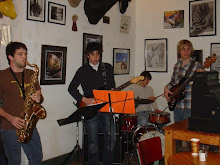Pace has everything to do with how a lesson turns out. Pace sets the tone for classroom behavior, classroom response, classroom participation, and classroom success. Granted, a lot of different paces can be used to get to the same end point, so perhaps an overall design should be applied to the pace of lessons over the course of the school year...hmmmm. Tough to do, but then again, I never am one for over planning, so having the idea that I am going to vary my pace over the course of a semester should be enough to actually implement this idea to some extent.
When giving speeches, one often has to pay attention to the speed at which they are speaking. Often, it is suggested that you time yourself when practicing, or even better, record yourself. I'd don't buy it...I usually mentally go over what I need to accomplish, and keep an eye on the clock and check where I am on my notes versus the time I have remaining. I feel things are better without beating them to death with practice. That being said, as a saxophonist/music educator, I am well aware of the value of practice and implement many strategies in my daily life that could prove very beneficial in giving a speech, or presenting a lesson. In a music classroom, especially with a performing group, pace can be very different from one song to the next, from one day to the next. By pace, I mean the speed at which you move from one task to the next, not the tempo at which you rehearse. However, rehearsal tempo is very important as well, but a much different topic than overall rehearsal pace.
During this first week or so, and I predict it will continue, my cooperating teachers push the rehearsal point to the limit and beyond. It is refreshing to see such high expectations in the classroom, however the cost of these high expectations and fast pace is still up in the air. At Stevenson, we expect students to be on time, with all materials (pencil, music, instrument), and to be paying attention at all times. Today was a prime example of this with the 4th period wind ensemble. The order for the day was on the board, as per usual and a common occurrence in nearly every music class I have set foot in. Chorale #4, Flight of the Bumblebee (which needs to be memorized), Rakes of Mallow, and I can't remember the rest...why, you ask? Because we didn't get there. Mr. Cain had intended to end the lesson with garden hose breathing exercises, but that didn't happen. When first we went back to the chorale after the bee, I was thinking, "okay, students aren't listening/working", after the second time I thought to myself, "uh-oh, Mr. Cain means business", and did he ever. We returned to the beginning of the rehearsal order time and time again for various reasons: one section isn't paying attention, lack of counting, lack of writing areas where mistakes happened, etc. We never made it past Rakes of Mallow, but I know have Flight of the Bumblebee memorized.
Today's pace is not unlike other days, however it was a Monday, and the kids weren't all there mentally...I bet they will be tomorrow. Although we constantly had to go back, no student complained, there were no major disruptions, only high expectations. If you want a group to perform well, be it academically, musically, or whatever, high expectation are the most important thing in the classroom. We always move fast, that is one thing I've always tried to do in rehearsal. Not move on, just move fast, get things done, get it done and get on with it. In some areas this is difficult; I would say at Stevenson, band overall is 90% musical/10% social, in rehearsal it is 99% musical/1% social. We aren't here to socialize, we are here to learn...socialize after class. By holding students accountable to what is said in class, and not repeating information already given, you force students to listen to what you have to say. No one likes repeating themselves. If you give students time to talk, they will take it. If you push the pace to the limit, they will follow.
Will the pace of rehearsal slow down? doubtfully. A routine is established, expectations are clear. Is the pace unbearable? No. Does progress occur? Yes. Is the program successful? Undeniably, look at the results of competitions, listen to the band, realize that they are playing music that many high schools play, or maybe can't play. It is a different world here.
Monday, January 10, 2011
Subscribe to:
Post Comments (Atom)

No comments:
Post a Comment